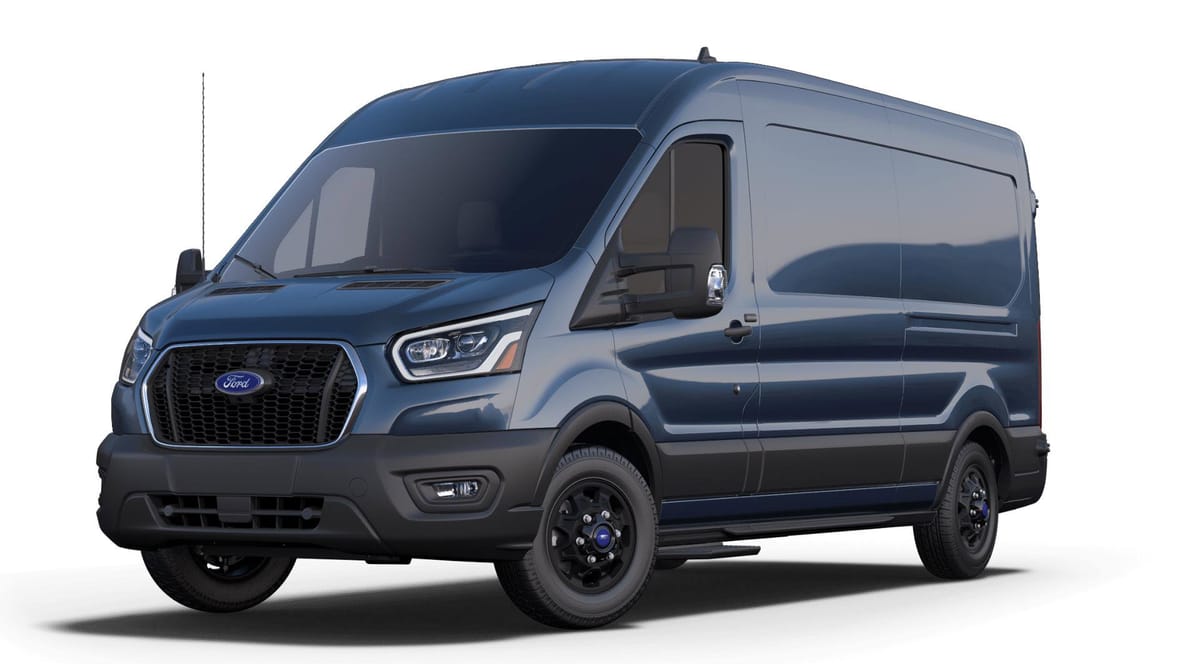Table Of Contents
Ford's Policy Changes on Electric Vehicle Leasing
Implications of Ford's Leasing Policy
Ford's Commitment to Sustainability
Background Information on Ford's Electric Vehicles
FAQ
As Ford navigates the evolving landscape of electric vehicles (EVs), the end of the lease for the Ford E-Transit marks a significant moment for both the company and its customers. With changes in leasing policies, including the elimination of the lease-to-buy option, and a strong commitment to environmental sustainability, Ford is at a crossroads that could redefine the future of electric mobility. This article delves into the implications of these policy shifts, Ford's sustainability efforts, and the broader impact on the EV market.
TLDR
- Ford has eliminated the lease-to-buy option for electric vehicles, impacting customer choices and market dynamics.
- The company is committed to carbon neutrality, with strategies focusing on battery lifecycle management.
- Current E-Transit leaseholders face new decisions at lease end, amidst changing industry trends.
- Ford's investments in battery technology and efforts towards carbon neutrality underscore its commitment to sustainability.
The Future of Ford's EV Leasing in Light of Battery Advancements
As Ford moves away from the lease-to-buy option for its electric vehicles (EVs), the automotive giant is not just responding to current market dynamics but also preparing for a future shaped by advancements in battery technology. The introduction of solid-state batteries into the EV market represents a significant leap forward, offering higher energy density, longer lifespans, and improved safety over traditional lithium-ion batteries. Ford's keen focus on sustainability and battery lifecycle management suggests that these advancements could profoundly influence its leasing policies and production strategies.
"Solid-state batteries could lead to extended lease terms or different leasing options that take into account the improved longevity of the batteries," suggests recent analysis from Ford's integrated sustainability and financial reports.
This shift could see Ford offering longer lease durations, acknowledging the reduced need for frequent battery replacements. Moreover, the enhanced recyclability of solid-state batteries aligns with Ford's environmental commitments, potentially transforming the company's approach to EV production and recycling. By prioritizing these batteries, Ford not only advances its sustainability agenda but also sets a new standard for the industry, emphasizing the importance of eco-friendly manufacturing and end-of-life vehicle processing.
The implications for Ford's global strategy are significant. As the company adapts its policies to incorporate these technological advancements, it could strengthen its position in international markets where sustainability and innovation are increasingly valued. This strategic pivot underscores Ford's commitment to leading the charge in the EV revolution, ensuring that its vehicles remain competitive and desirable in a rapidly evolving automotive landscape.
Source: Ford's 2023 Integrated Sustainability and Financial Report
Ford's Policy Changes on Electric Vehicle Leasing
Ford's Big Shift: No More Lease-to-Buy for EVs
What's Going Down with Ford's EV Leasing
So, Ford's shaking things up with how they handle their electric vehicles (EVs) like the F-150 Lightning, Mustang Mach-E, and E-Transit Van. Starting June 15, 2022, if you're leasing one of these bad boys, you won't have the option to buy it when your lease is up. This news, confirmed by Ford to CarsDirect, is a game-changer for folks looking to hold onto their EVs long-term. Initially, this is rolling out in 37 states, with the rest catching up by the end of the year. It's a move we've seen from other EV makers, like Tesla, who've already cut the lease-to-buy option.
How This Hits Customers and the EV Scene
This switch means if you're leasing a new Ford EV, you gotta hand it back when the lease is up, no option to buy it. This could throw a wrench in the plans for those who were counting on buying their leased vehicle. For the used EV market, this could mean fewer options out there since Ford's keeping a tight grip on these vehicles. It's a clear signal that Ford's betting big on the future value of their EVs and has plans for them down the line.
This move might make some folks think twice about leasing a Ford EV, knowing they can't buy it at the end of the lease. It's a significant shift in how we think about leasing and owning electric vehicles, showing that automakers like Ford are thinking long-term about how these vehicles live and die.
Ford's Eye on the Environment
Ford's not just making these changes for kicks. It's all part of their bigger goal to hit carbon neutrality by 2050. By keeping control of their EVs post-lease, they can make sure those batteries are handled right, whether that means recycling or reusing them. This is Ford stepping up, saying they're serious about doing their part for the planet. It's a move that's got them looking at the whole lifecycle of their vehicles, making sure they're as green as possible from start to finish.
The Bigger Picture on Batteries
Ford's decision to axe the lease-to-buy option isn't just about keeping their EVs in-house; it's a big play in their strategy for a more sustainable future. They're looking to have a say in the entire lifecycle of their vehicles, especially those batteries. It's all hands on deck for making EVs more sustainable and affordable, from beefing up U.S. battery production to making sure old batteries get a second life. Ford's laying down a marker here, showing they're in it for the long haul when it comes to environmental responsibility and the future of electric transport.
So, there you have it. Ford's making moves that could shake up how we lease, own, and think about EVs. It's all about looking ahead, keeping those EVs green, and making sure they're doing right by the planet.
Implications of Ford's Leasing Policy
Options for Current Leaseholders
Hey, if you're currently cruising around in a Ford E-Transit or thinking about snagging one, there's some news you gotta know. Ford's gone and changed the game on us, saying "nope" to letting folks buy their leased electric vehicles (EVs) once the lease is up. This shake-up hit the scene on June 15 in a bunch of states, with plans to roll out everywhere by year's end. If you're itching for the nitty-gritty, dive into the chatter over at MachEClub or catch the scoop at Autoblog and Teslarati.
So, if you were daydreaming about making your leased E-Transit yours forever, that bubble's burst. Ford's playing the long game, aiming to keep a tight grip on their used EV market. It's a bummer for some, sure, but it's the way the wind's blowing in the EV world.
But hey, it's not all doom and gloom. Ford's rolling out the Ford Options Plan, a cool alternative that lets you snag the federal tax credit and still have a shot at owning your ride. Worth a look, right? Check out the same MachEClub link for the lowdown.
Future Leasing Considerations
Got your eye on a Ford E-Transit lease? Keep in mind, Ford's flipped the script on their end-of-lease buyout option. No more buying your leased EV when the term's up. This new rule's already live in a bunch of states, with the rest on the waiting list. It's a big pivot in Ford's playbook, especially for their electric lineup, which includes the likes of Mustang Mach-E and F-150 Lightning.
For those about to lease, this means you gotta wave goodbye to any buyout dreams post-lease. Ford's reshuffling the deck to stay ahead in the EV game.
For the inside track on this, hit up Autoblog and MachEClub. It's a heads-up worth taking seriously if you're mulling over an E-Transit lease.
Industry Trends
Comparison with Other Automakers
Alright, let's see how Ford stacks up against the competition with this lease buyout business. Ford's basically saying "see ya" to lease buyouts for their EVs, joining the club Tesla started. Here's a quick rundown:
| Automaker | Policy on Lease Buyouts for EVs |
|---|---|
| Ford | Kiss goodbye to lease buyouts for all electric vehicles, including Mustang Mach-E, F-150 Lightning, and E-Transit. Source |
| Tesla | Already said "no thanks" to lease buyouts for all models back in April. Source |
Ford's aiming to keep a lid on their EVs' second lives, eyeing that carbon neutrality trophy by 2050. It's a different beat from other carmakers who might still let you buy out your lease. By sizing up Ford against Tesla, it's clear the big guns in EV land want to keep their rides in their own backyards, especially when it comes to managing those precious batteries.
Potential Long-term Effects on EV Market
Ford's move to end lease buyouts, just like Tesla did, is shaking up the EV scene. They're all about controlling their EV batteries' fate, gunning for that carbon-neutral goal by 2050. This strategy could change how we all think about leasing versus buying EVs. Here's the potential ripple effect:
| Aspect | Impact on EV Market |
|---|---|
| Lease Buyout Restrictions | Might push folks away from leasing, nudging them towards buying outright or checking out brands with more chill end-of-lease vibes. |
| Battery Lifecycle Management | Sets the stage for greener practices, making sure those batteries get a second act, which could become the gold standard. |
| Market Dynamics | Could heat up the demand for used EVs, as the pool of lease-to-own options dries up. |
Ford's strategy is a glimpse into a future where EV makers play a bigger role in the afterlife of their vehicles, especially those battery packs. It's a trend that could spread, shaping how the EV market evolves.
Ford's Commitment to Sustainability
Investments in Battery Technology
As your Ford E-Transit lease wraps up, it's worth diving into Ford's big picture on electric vehicles (EVs) and how it shakes up your choices. Ford's been pouring cash into battery tech to make its Battery Electric Vehicles (BEVs) more sustainable and wallet-friendly. They're all about bringing the battery biz closer to home, giving old EVs a second life through recycling, and cranking up battery production in the U.S. A major play in this game plan is Ford's move to stop lease buyouts for its electric fleet, including the E-Transit. They want to keep a tight grip on those batteries from cradle to grave, aiming to keep them in the Ford family. This strategy is a cornerstone of Ford's ambition to hit carbon neutrality by 2050.
For the nitty-gritty, check out the scoop on InsideEVs and Teslarati, where they break down Ford's leasing policy shake-up and what it means for you and the planet.
Efforts Towards Achieving Carbon Neutrality
Ford's axing of the lease-end buy option for its EVs, including the E-Transit, is a bold step towards its 2050 carbon neutrality goal. Kicking off on June 15 in 37 states, with plans to spread, this policy highlights Ford's commitment to battery lifecycle management and keeping them in-house for recycling or reuse. This move is all about making BEVs more planet-friendly and easier on the pocketbook, tackling both green concerns and the cost of EV ownership head-on. For folks looking at leasing, this means waving goodbye to the option of owning your leased EV when the term ends. It's a big shift, but it's in line with the wider push for sustainability and cutting down on carbon footprints.
Dive deeper into this topic with articles on Autoblog, InsideEVs, and Teslarati.
Background Information on Ford's Electric Vehicles
Evolution of Ford's Electric Vehicle Lineup
Kicking Off with the E-Transit
Ford's been stepping up its game in the electric vehicle (EV) world, rolling out cool rides like the Mustang Mach-E, F-150 Lightning, and the E-Transit. The E-Transit's a big deal because it shows Ford's diving into making work vehicles electric, giving businesses a greener option. But, here's the kicker: starting June 15, 2022, Ford's saying "nope" to letting folks buy their leased EVs once the lease is up. This includes the E-Transit too. So, if you were planning to keep your leased Ford EV forever, that's off the table (InsideEVs; Teslarati). Ford's playing the long game here, wanting to keep an eye on those EV batteries and make sure they're recycled or reused right, all part of their big plan to be carbon neutral by 2050. They're also hoping to make EVs more wallet-friendly by beefing up battery production in the U.S. and keeping things local.
Where Ford Stands in the EV Crowd
Ditching the lease-to-buy option puts Ford in a unique spot in the EV race. It's kinda like what Tesla did a while back, showing that more car makers want to keep tabs on their EVs even after the lease is done. Ford's laser-focused on electric, especially with stars like the Mustang Mach-E, F-150 Lightning, and E-Transit, but they're not applying this new rule to hybrids or plug-ins. This move is Ford's way of saying, "We're all in on electric," setting them apart from the pack and maybe even nudging folks to think more about going electric. It's a smart play that could boost Ford's image as a forward-thinker in the EV transition, catching the eye of folks who dig green tech and want to be part of the electric wave.
FAQ
Why did Ford decide to eliminate the lease-to-buy option for their electric vehicles?
Ford made this decision as part of their broader strategy to manage the lifecycle of their electric vehicles, particularly focusing on the batteries. By retaining control over the vehicles after the lease ends, Ford can ensure proper recycling or reuse of the batteries, aligning with their goal to achieve carbon neutrality by 2050.
Which Ford electric vehicles are affected by the new leasing policy?
The new leasing policy affects all of Ford's electric vehicles, including the F-150 Lightning, Mustang Mach-E, and E-Transit Van. This policy does not apply to Ford's hybrid or plug-in hybrid models.
When did Ford's new leasing policy take effect?
Ford's new leasing policy took effect on June 15, 2022, in 37 states, with plans to expand to the remaining states by the end of the year.
Are there any alternatives to leasing offered by Ford for those interested in electric vehicles?
Yes, Ford introduced the Ford Options Plan as an alternative to traditional leasing. This plan allows customers to still benefit from the federal tax credit and potentially own their vehicle at the end of the term. More details can be found on Ford's official website or by visiting forums like MachEClub.
How does Ford's new leasing policy compare to other automakers' policies on electric vehicle leasing?
Ford's policy is similar to Tesla's, which had previously eliminated the lease-to-buy option for its models. This move by Ford and Tesla indicates a trend among automakers to retain control over the lifecycle of their electric vehicles, particularly for battery management and sustainability goals.
What are the implications of Ford's new leasing policy for the used EV market?
Ford's decision to retain control over its leased electric vehicles could lead to fewer options in the used EV market, as these vehicles will not be available for purchase at the end of their leases. This could impact the availability and pricing of used electric vehicles from Ford.
How does Ford plan to manage the batteries from its electric vehicles post-lease?
Ford aims to either recycle or reuse the batteries from its electric vehicles. This is part of their commitment to sustainability and their goal to achieve carbon neutrality by 2050. Proper battery management is crucial for reducing environmental impact and promoting the circular economy in the EV industry.
What is Ford's ultimate goal with these changes to its electric vehicle leasing policy?
Ford's ultimate goal is to support its sustainability efforts and achieve carbon neutrality by 2050. By retaining control over its electric vehicles after leases end, Ford can ensure responsible battery management, contribute to a more sustainable future, and potentially influence the market towards greater adoption of electric vehicles.
Can current leaseholders of Ford electric vehicles buy their vehicles at the end of the lease?
No, current leaseholders of Ford electric vehicles will not have the option to purchase their vehicles at the end of the lease term, as per the new policy that took effect on June 15, 2022. This applies to all Ford electric vehicles leased after this date.
How might Ford's new leasing policy affect consumer decisions regarding electric vehicle leasing versus buying?
Ford's new leasing policy might encourage consumers to consider buying electric vehicles outright instead of leasing, especially for those who prefer ownership or want to avoid the uncertainty of not being able to purchase the vehicle at the end of the lease. It could also lead potential customers to explore other brands that offer more flexible end-of-lease options for electric vehicles.




